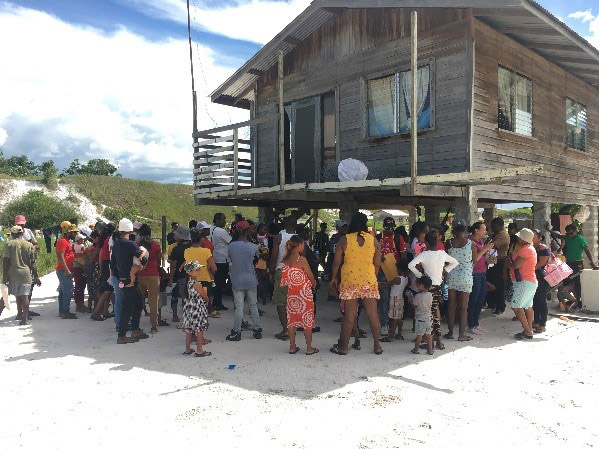The Guyana Human Rights Association (GHRA) yesterday flayed the police over the manner in which the recent enforcement of a court-ordered eviction was conducted and is appalled at the treatment meted out to mostly poor people.
In a release, the GHRA “roundly” condemned the violence employed by the Guyana Police Force (GPF) in enforcing a court order to remove families from the bottom of Hill Foot and the Ideal areas about 10 kilometres in from the Linden Highway on Wednesday night, May 31.
The police have not responded to the charges of brutality against the squatters.
The association estimated that 60 per cent of the affected people are Amerindians, 25 per cent Indo-Guyanese, and 15 per cent Afro-Guyanese. Further, over 40 children were left homeless and about 17 homes were destroyed.
“Brutal enforcement of this nature is indefensible regardless of the validity of a Court Order. Apart from the direct trauma visited on the affected families, the nation was shocked by the graphic social media (images) of mayhem generated by the supposed forces of law and order.”
As the GHRA understands it, these are the events that took place. The police and court marshals visited the community when most people were at work and children at school. Residents returned home to find their houses flat on the ground and possessions strewn around. A young woman was shot, her wounds seen by all on social media, another claimed her arm to be either broken or fractured, along with blood and beatings. Another woman was allegedly assaulted by six male officers and shots fired in her direction because she refused to move. A man was detained for videoing the scene.
The release also cautions that the term ‘squatters’, does not adequately capture the fact that some of the homes destroyed were substantial, with some residents claiming to have lived there for a decade or more. It however noted that some gardens with vegetable and farming produce were left untouched.
In light of what happened that Wednesday, as far as the GHRA is concerned, a multitude of questions need answers. “The most prominent is who ordered and paid for the police to undertake the assault on the community? Did they do it on their own volition? Further, why is implementing an order to destroy a community treated as a routine administrative matter conducted by Court Marshals and the police? It also reminded that the authorities have enough experience of confrontations with poor people over housing to know that they have to be properly planned.
As such, the association opined that the scale of what was to be done should have involved all the ministries that have to deal with the consequences of “obliterating” a ‘squatter’ community: namely, Housing, Communities, Social Protection, Indigenous Peoples’ Affairs, Education, as well as the Regional authority.
It averred that it is the responsibility of both the government and the Guyana Police Force to demonstrate the steps needed to be taken in order to effect peaceful removal before resorting to the “savagery” on display. It also predicted that the “slothfulness and disinterest” of the Ministry in ensuring efficiency in these operations may encourage vigilante justice by frustrated claimants: an action that never ends well.
“Acquiring house lots is the most persistent and contentious complaint by lower income people for decades. Police energies would be better served investigating that issue rather than being so readily available to enforce Court Orders for the better off.”
And in reaching for a more holistic view, the GHRA underscored that in addition to the trauma to which Indigenous communities were subjected by the recent dormitory fires in Mahdia and Karasabai, the violence visited on the Hill Foot community “raises the curtain” on the numbers of Indigenous peoples who feel forced to migrate to coastal areas. Also noted was the fact that their numbers on the Highway, East Bank and East Coast are significant as their original communities are no longer the traditional safe haven they used to be, with itinerant gold-mining and cross-border criminals bringing violence and social disruption of all kinds.
“The dominant obsession with wealth comes at a cost to and sacrifice of others whose rights are no less valid and who ought to have first claim on the services of protection, including the police,” the release added.





